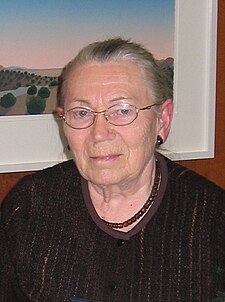Anna Walentynowicz
| Anna Walentynowicz | |
|---|---|
 Anna Walentynowicz (2005)
|
|
| Born |
15 August 1929 Równe, Poland (now Rivne, Ukraine) |
| Died | 10 April 2010 (aged 80) Smolensk, Russia |
| Occupation | Free trade union activist |
Anna Walentynowicz (Polish pronunciation: [ˈanna valɛntɨˈnɔvit͡ʂ]; 15 August 1929 – 10 April 2010) was a Polish free trade union activist.
Her firing in August 1980 was the event which ignited the strike at the Lenin Shipyard in Gdańsk, set off a wave of strikes in Poland, and quickly paralyzed the Baltic coast.
The Interfactory Strike Committee (MKS) based in the Gdańsk shipyard eventually transformed itself into Solidarity trade union, of which she became a prominent member.
By September, more than one million workers were on strike in support of the 21 demands of MKS, making it the largest strike ever.
Walentynowicz's arrest became an organizing slogan (Bring Anna Walentynowicz Back to Work!) in the early days of the Gdansk strike. She is referred to by some as the "mother of independent Poland."
Born in 1929 in Rivne (which is now Ukraine) as Anna Lubczyk, was orphaned during the Second World War and repatriated into Poland. She began working in the Lenin Shipyard in Gdańsk, Poland in 1950, first as a welder, later as a crane operator. Recognized as a "Hero of Socialist Labor" or Stakhanovite for her hard work, Walentynowicz became disillusioned with the communist system in Poland, especially after the bloody events in December 1970 on the Baltic Coast (Polish 1970 protests). While she was an activist and a member of a socialist youth organization, she was never formally a member of the communist party. Anna was a devout Catholic, who believed in social justice and standing up against oppression, became deeply moved her later years by the teachings of John Paul II with whom she developed a personal relationship. One of the last letters which John Paul II wrote was to Anna Walentynowicz wishing her speedy recovery from a back injury. Anna began her quest for justice by speaking out publicly when one of her supervisors stole money from the workers' bonus fund to win a lottery. Instead of reprimanding the corrupt supervisor, the system turned on her—she was harassed by secret police. The 'exemplary worker' and 'Hero of Socialist Labor' had become a vocal dissident, because the so-called workers state did not care about its workers. Walentynowicz joined the newly formed WZZ or Free Trade Unions of the Coast in 1978, and in the early 1980s came to symbolize the opposition movement, along with her colleagues from the WZZ, Lech Wałęsa, Andrzej Gwiazda, Bogdan Borusewicz, Alina Pienkowska, the Wyszkowski brothers and Andrzej Kołodziej. As editor of the Polish samizdat (bibuła) Robotnik Wybrzeża (The Coastal Worker), she distributed an underground newsheet at the shipyard; she often challenged the authorities, not was it uncommon for her to openly challenge her superiors.
...
Wikipedia
